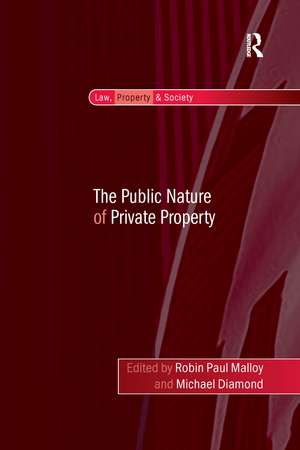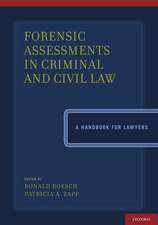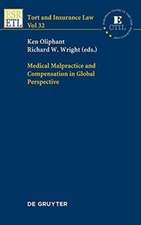The Public Nature of Private Property: Law, Property and Society
Autor Michael Diamond Editat de Robin Paul Malloyen Limba Engleză Paperback – 11 noi 2016
| Toate formatele și edițiile | Preț | Express |
|---|---|---|
| Paperback (1) | 465.91 lei 6-8 săpt. | |
| Taylor & Francis – 11 noi 2016 | 465.91 lei 6-8 săpt. | |
| Hardback (1) | 1101.00 lei 6-8 săpt. | |
| Taylor & Francis – 28 iul 2011 | 1101.00 lei 6-8 săpt. |
Preț: 465.91 lei
Nou
Puncte Express: 699
Preț estimativ în valută:
89.22€ • 91.93$ • 74.87£
89.22€ • 91.93$ • 74.87£
Carte tipărită la comandă
Livrare economică 21 februarie-07 martie
Preluare comenzi: 021 569.72.76
Specificații
ISBN-13: 9781138251977
ISBN-10: 1138251976
Pagini: 280
Dimensiuni: 156 x 234 mm
Greutate: 0.45 kg
Ediția:1
Editura: Taylor & Francis
Colecția Routledge
Seria Law, Property and Society
Locul publicării:Oxford, United Kingdom
ISBN-10: 1138251976
Pagini: 280
Dimensiuni: 156 x 234 mm
Greutate: 0.45 kg
Ediția:1
Editura: Taylor & Francis
Colecția Routledge
Seria Law, Property and Society
Locul publicării:Oxford, United Kingdom
Cuprins
Contents: Preface, Michael Diamond; The public nature of property rights and the property nature of public law, J. Peter Byrne; Explaining the persistent myth of property absolutism, David Fagundes; Shared equity housing: cultural understanding and the meaning of ownership, Michael Diamond; Crisis and the public-private divide in property, Nestor M. Davidson and Rashmi Dyal-Chand; Eviction and the public interest: the right to respect for home in English law, Lorna Fox O'Mahony; Opening neighborhoods to people with mobility impairment: property, disability and inclusive design housing, Robin Paul Malloy; Who should fix the sink? Addressing maintenance and repairs in limited equity cooperatives, Jennie O'Flanagan; Preserving public peace, protecting private property, Susan S. Kuo; Adult adoption of lovers and spouses to help ensure their inheritance: fair or foul?, Terry L. Turnipseed; Table of cases; Table of statutes and legislative material; Bibliography; Index.
Notă biografică
Robin Paul Malloy is E.I. White Chair and Distinguished Professor of Law at Syracuse University, and editor of Ashgate's Law, Property and Society series. Michael Diamond is Professor of Law at Georgetown University Law Center, and author of Corporations: A Contemporary Approach (Carolina Academic Press, 2008).
Recenzii
'The Public Nature of Private Property contains a set of thought-provoking essays written by leading property law scholars, centered upon a single motif involving the nature of property. Modern property discourse usually adopts a frame portraying private property and public regulation as antagonists. From this perspective the task is to decide when private property rights must bend to protect or serve other public interests. These contributions reframe the debate by adopting a different vantage point. Public regulation can be seen as part of the definition of private property, rather than an incursion on property. The reframing has value for two reasons. First, it more accurately reflects the centuries-old history of how the Anglo-American understanding of property has evolved. Second, it enhances the discourse by putting the two strains, private and public property rights, on a level playing field.' James Charles Smith, University of Georgia, USA 'The Public Nature of Private Property is a valuable resource both for the academic property lawyer and the academic administrative lawyer.' The Cambrian Law Review
Descriere
In this book leading experts discuss the public nature of private property and challenge traditional conceptions of private property. They present a range of views on both the meaning of private property, and on the ability, some might say the requirement, of the state to regulate it. What rights to intrude does the public have in what is generally accepted as private property? The answer, perhaps surprisingly to some, is that the public has not only a significant interest in regulating the use of private property but also in defining it, and establishing its contour and texture.


















